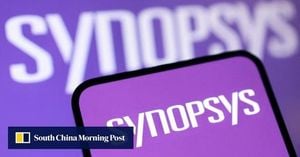Walt Disney World, known for creating magical experiences, is facing scrutiny after a former employee allegedly used their insider knowledge to hack the restaurant menu system. This incident raises serious questions about cybersecurity and employee responsibilities, particularly when it involves sensitive information like food allergen warnings.
The accused, Michael Scheuer, was fired from his position as a menu production manager last June. According to federal authorities, following his termination, Scheuer accessed Disney’s servers to change prices on menus, insert profanities, and even claimed certain allergenic items were safe for individuals with allergies. This alarming breach was detailed in a criminal complaint filed against him.
Authorities reveal Scheuer was arrested last week thanks to the investigations conducted by the FBI. His defense attorney, David Haas, indicated his client plans to enter a not guilty plea upon the filing of formal charges. Until then, Scheuer remains incarcerated, awaiting a bond hearing scheduled for the following week. Haas has pointed out his client's long-standing mental health struggles and criticized jail authorities for failing to provide adequate mental health support during his detention.
This hacking incident wasn’t just about mischief. According to the complaint, Disney managed to catch the altered menus before they were distributed to restaurants—a fortunate turn, considering the potential fatal consequences. The adjustments made to allergen notifications posed significant safety risks, especially for those with severe allergies. Had these changes gone undetected, they could have endangered numerous patrons.
Disney was forced to take its menu creation program offline for over a week to mitigate damages resulting from the breach. The financial impact? A staggering estimate of at least $150,000. The internal investigation led to the discovery of Scheuer as the primary suspect, highlighting the contentious nature of his dismissal, which was not amicable and left both parties at odds.
Reports indicate Scheuer had exclusive knowledge and access to the systems required to make such alterations, placing him as the sole individual capable of executing the attacks, as cited by the criminal complaint. Interestingly, the complaints detail attempts by Scheme to log onto Disney employees' accounts, locking out 14 staff members through automated login scripts. A folder containing personal information about these employees was also found, hinting at premeditated actions against his former colleagues.
This incident is not merely another case of workplace misconduct; it showcases vulnerabilities within Disney’s internal systems and raises broader questions about cybersecurity measures within major corporations. Following the breach, Disney has opted to maintain silence, refraining from public comments about the event as they deal with the ramifications.
Reflecting on the broader picture, experts warn this hacking scenario reflects the increasing risks businesses face, especially when dealing with disgruntled employees. Insider threats, as noted by cybersecurity analysts, can be just as, if not more, damaging than external attacks. Organizations like Disney need to fortify their defenses not only against external hackers but also against potential insider malfeasance.
Meanwhile, the digital world remains ever-evolving, with more individuals fitting the mold of ‘hacktivists’—those who breach security not for financial gain but for personal expression or revenge. Scheuer’s case may directly connect to this trend of taking hacking risks for personal reasons, particularly as he felt devastated after his dismissal.
This hacking incident might spur other organizations to revisit their security protocols and employee management strategies. With insider threats becoming more common, companies need to develop comprehensive approaches to risk management. Monitoring systems to prevent unauthorized access post-termination could be one measure to prevent similar events.
Tracing back to the initial incident, as more information surfaces, it’s clear the entanglements of cybersecurity and employee satisfaction warrant serious strategic assessments. The fallout from Scheuer's alleged actions at Disney might just open the floodgates for urgent conversations on how to safeguard sensitive information against those who once had entrusted access.
Understanding the consequences of such breaches will likely be influential. Safety within dining contexts relies heavily on clear communication for allergen statuses, and any undermining of these systems compromises the very essence of customer care—an area Disney is traditionally seen to excel.
The drama surrounding this incident has just begun to unfurl, and as the details continue to emerge, the story serves as both cautionary tale and wake-up call for industries managing sensitive consumer information.
With public trust at stake, Disney now must strategize its response not solely for public relations but also for reinforcing its commitment to guest safety. Transparency about the steps taken to rectify vulnerabilities and prevent future breaches will be needed to keep their theme park reputation intact.



